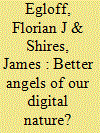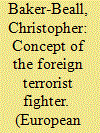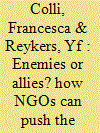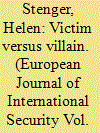|
|
|
Sort Order |
|
|
|
Items / Page
|
|
|
|
|
|
|
| Srl | Item |
| 1 |
ID:
190905


|
|
|
|
|
| Summary/Abstract |
Transformations in state violence are intimately associated with technological capacity. Like previous era-defining technologies, global digital networks have changed state violence. Offensive cyber capabilities (OCCs) appear to constitute a major technological development that offers the potential for reducing state violence. This article asks: are OCCs really the better angels of our digital nature? Current scholarship in strategic studies, adopting a narrow definition of violence, conceives of OCCs as largely non-violent. This ignores how technology has given rise to new forms of harm to individuals and communities, particularly in the context of violent state repression. We propose using an expanded definition of violence, including affective and community harms, and argue that OCCs relocate, rather than reduce, state violence towards non-bodily harms. Even though their lethal effects are limited, OCCs are not, as is supposed, a non-violent addition to state arsenals. This conclusion has important implications for international affairs, including re-orienting defensive cybersecurity efforts and altering calculations around the perception of OCCs by adversaries.
|
|
|
|
|
|
|
|
|
|
|
|
|
|
|
|
| 2 |
ID:
190899


|
|
|
|
|
| Summary/Abstract |
The conflicts in Iraq and Syria have led to concerns in the West over ‘foreign fighters’. Although states are anxious about the role these individuals play in the conflicts they join, their primary concern relates to the perceived ‘terrorist’ threat they pose on their return. This fear has led to an evolution in the international policymaking arena, with foreign fighters now often referred to as ‘foreign terrorist fighters’ (FTFs). A Critical Theory-inspired immanent critique is offered to highlight various problems that exist with the FTF term and to argue policymakers should resist its use. The article demonstrates the importance of language by showing how the invocation of the FTF threat has strengthened the ongoing development of globally coordinated counterterrorism action. Specifically, it argues UN Security Council Resolution 2178, agreed in 2014, generates a legal obligation upon UN member states to implement new counterterrorism laws at national level to combat the perceived threat from FTFs. The article highlights the negative effect these laws have on human rights. It is argued institutions like the UN need to ensure new counterterrorism legal instruments are built from a human rights rather than security-first perspective if commitments to human rights in transnational counterterrorism are to be fully realised.
|
|
|
|
|
|
|
|
|
|
|
|
|
|
|
|
| 3 |
ID:
190901


|
|
|
|
|
| Summary/Abstract |
This article examines the conditions under which non-governmental organisations (NGOs) gain access to defence administrations when campaigning for transparency around the use of military force. We theorise that gaining access in this traditionally secluded domain is a matter of supply and demand. NGOs can gain access through technical and political information, yet not without demand for these resources, dependent on the politicisation of concerns about the use of force. We focus on the activities of Airwars, an international NGO, and its campaign in the Netherlands (2015–20) to foster transparency about civilian casualties caused by Dutch airstrikes. Our analysis shows that their credible information about air strikes led to access to the defence administration and allowed them to effectively advocate for transparency, mediated by the politicisation of the issue through parliamentary and media attention. Our findings contribute both to the literature on NGO advocacy and to the field of civil-military relations.
|
|
|
|
|
|
|
|
|
|
|
|
|
|
|
|
| 4 |
ID:
190900


|
|
|
|
|
| Summary/Abstract |
In 2014, eight years prior to the Russian invasion of Ukraine in 2022, Russian-backed separatists seized parts of the Ukrainian regions Luhansk and Donetsk. Shortly thereafter, thousands of Ukrainians voluntarily enrolled to various paramilitary battalions. Unlike the Right Sector's Volunteer Ukrainian Corps (RS VUC), almost all battalions were incorporated into Ukrainian official defence structures. Applying uncertainty-identity theory and based on interviews, observations, and documents, this study investigates the attractiveness of RS VUC prior to the 2022 war, motivating the fighters to join this organisation and to remain in it. The study found that fighters of RS VUC distrusted society, the wider population, and state authorities. RS VUC, with its high fighting morale, discipline, family-like relationships between fighters, as well as its clear ideology and boundaries between ‘us’ and ‘them’, were attractive to the fighters since its unambiguous group prototypes and high entitativity, reduced the fighters’ self-uncertainty regarding their social identity in an uncertain environment. The findings also revealed that the fighters’ choice to join RS VUC can be understood as a rational decision, since RS VUC's group entitativity provided the fighters with moral and emotional benefits, as well as maximised their chances of survival.
|
|
|
|
|
|
|
|
|
|
|
|
|
|
|
|
| 5 |
ID:
190903


|
|
|
|
|
| Summary/Abstract |
Evolving official Russian identifications of Georgia amount to a dangerous securitisation of this small neighbour – achieved through a focus not on Georgia itself but on Western engagement in the region. With the long absence of face-to-face diplomatic encounters and contact, the Russian idea of Georgia as a ‘Western proxy’ has become entrenched. This article advances a social explanation of Russian foreign policy that speaks to geopolitical explanations in foregrounding great power interaction and security by drawing on insights from a discourse-theoretical reading of securitisation theory. It adds value to social explanations by showing how the identification of another political entity can be changed into that of a ‘proxy’ through its integration into a larger ‘radically different other’, and how this expansion occurs in interplay with interpretations of physical manifestations of the larger ‘radically different other’ in the ‘proxy’. Finally, it draws attention to the impact of physical encounters on foreign policy in these times of COVID-19, war, and growing isolationism in world affairs.
|
|
|
|
|
|
|
|
|
|
|
|
|
|
|
|
| 6 |
ID:
190904


|
|
|
|
|
| Summary/Abstract |
This article offers an alternative conceptualisation of prudence as encompassing four normative components: reflective reasoning, experience, long-term well-being, and moderation. Prudence involves a pattern of reflective reasoning informed by experience in the pursuit of long-term well-being through moderate judgements and actions. This conceptualisation allows distilling a set of prescriptions for guiding deliberation and choice under uncertainty, which I name the Prudent Judgement Approach. An analysis of John F. Kennedy's deliberations at the start of the Cuban Missile Crisis uncovers evidence of prudent judgement and demonstrates the practical feasibility and value of this approach. Although the numerous cognitive and procedural sources of errors in decision-making under uncertainty are by now well understood, there are few prescriptive approaches for guiding the process of formulating judgements and making choices. This article shows how prudence can help improve the quality of deliberative processes and policy choices.
|
|
|
|
|
|
|
|
|
|
|
|
|
|
|
|
| 7 |
ID:
190898


|
|
|
|
|
| Summary/Abstract |
State responses to repatriation of Islamic State (ISIS) foreign fighters and their children detained across Syria and Iraq are highly diverse. Repatriation policies implemented between 2018 and 2020 range from denying repatriation of nationals and revocation of citizenship to repatriation and subsequent gender-responsive rehabilitation programmes. What explains the variation in state responses? This article seeks to explain why repatriation policies differ despite the global challenges faced by all states. It investigates and categorises the repatriation policies for foreign fighters across 69 countries ranging from unconditional repatriation to denying repatriation. To explain the state responses to a common security and human rights dilemma, a mixed-method approach is employed involving an explorative statistical analysis to test key explanations and a narrative analysis. The findings reveal how diverse social constructions of gendered and racialised ‘threat narratives’ of foreign fighters in policy documents and the media explain variation in foreign fighter repatriation policies.
|
|
|
|
|
|
|
|
|
|
|
|
|
|
|
|
|
|
|
|
|